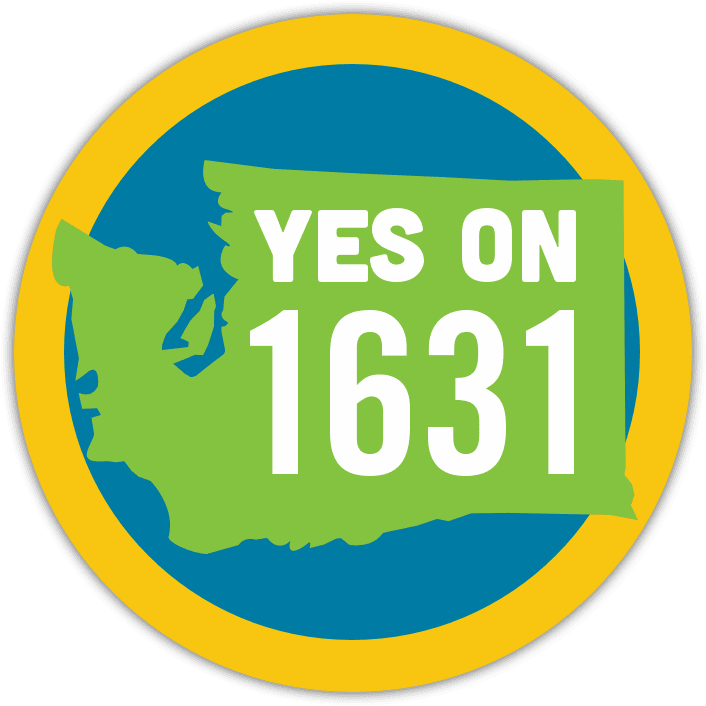On April 20, 2018, the Board of LWVWA voted to endorse Initiative 1631, the " Protect Washington Act." This measure would charge pollution fees on sources of the greenhouse gas pollutant carbon dioxide, and use the revenue to reduce pollution, promote renewable energy, and address climate change impacts, with the oversight of a public board.
The Initiative is sponsored by The Alliance for Jobs and Clean Energy, a coalition of 201 organizations, mostly labor, environmental and social justice groups. It will require 260,000 signatures by July 6th. The League supports addressing climate change by putting a price on carbon, and we believe this is the next best opportunity and the place we must start.
Initiative 1631 – A fee on Carbon Dioxide Emissions in Washington
 Initiative 1631 levies a pollution reduction fee in the amount of $15 per ton of CO2 equivalent on fossil fuels used within Washington. The amount increases annually by $2 per ton, capping at $55 ($40 adjusted for inflation). It is expected to initially generate up to $1 Billion annually with the revenue allocated 70% for clean energy (includes retraining for workers and impacted low income programs), 25% for water and forest restoration and resiliency, and 5% for healthy communities. A qualifying light and power business or gas distribution business may claim credits for up to 100% of the pollution fees for which it is liable to invest in approved carbon reduction programs.
Initiative 1631 levies a pollution reduction fee in the amount of $15 per ton of CO2 equivalent on fossil fuels used within Washington. The amount increases annually by $2 per ton, capping at $55 ($40 adjusted for inflation). It is expected to initially generate up to $1 Billion annually with the revenue allocated 70% for clean energy (includes retraining for workers and impacted low income programs), 25% for water and forest restoration and resiliency, and 5% for healthy communities. A qualifying light and power business or gas distribution business may claim credits for up to 100% of the pollution fees for which it is liable to invest in approved carbon reduction programs.
Notable fee exemptions include TransAlta coal transition (protected from additional fees by previous legislative agreement to close this plant in 2025), public transportation, state vehicles, aviation, marine and agriculture fuels and other EITEs (Energy Intensive Exemptions) such as aluminum and steel. There are 23 exemptions compared to the Governor's bill (SB 6203) which had 55 exemptions and an initial fee of $12 per ton. The 2016 Initiative 732 levied a fee starting at $25 per ton, was designed to be revenue neutral, had fewer exemptions, but was criticized for not adequately addressing impacted workers and communities.
A 15-member Public Oversight Board, appointed by the Governor, will oversee the implementation of this initiative. The Joint Legislative Audit and Review Committee and Oversight Board shall review and report on the timeliness, efficiency and effectiveness of implementation of the Act. Advisory Panels will create evaluation criteria and make funding recommendations on projects.
Initiative 1631 is currently endorsed by most environmental groups, labor groups and 29 tribes. Signers include The Washington State Labor Council, Sierra Club, The Nature Conservancy, Washington Environmental Council, Washington Conservation Voters, Climate Solutions, Got Green, and One America.
The Washington Retailers Association currently opposes 1631. If the measure makes it to the ballot, it is expected that the fossil fuel industries will oppose it as well, along with tax opponents concerned about price increases on auto fuel, heating oil, and natural gas. The proposed per ton fee would add 14 cents per gallon of gasoline in 2020 rising to over 40 cents per gallon in 2035, provided that the cost is passed through to consumers.
In 2012 the League launched an initiative to urge the President to use executive authority under the Clean Air Act to control carbon pollution in the face of the greatest environmental challenge of our generation: climate change (2016 LWVUS Impact on Issues, p. 60). The LWVUS believes that climate change is a serious problem that requires immediate action and urges initiatives to reduce emissions of heat-trapping gases to reduce the threat of global climate change, combat air pollution, increase energy security and create new jobs (LWVUS Impant on Issues p. 59-60 and LWVWA Program in Action, p. 26).
LWVWA took steps consistent with LWVUS positions in 2000 for the purpose of bringing Global Climate Change issues to members, other citizens, and legislators’ attention for action. League members recognized that this topic is inextricably linked with energy, water, transportation, forests, clean air, and other issues on which the League has positions and takes action. An off-board portfolio chair was established to address Global Climate Change. Since then, LWVWA has joined local and regional groups with similar goals (LWVWA Program in Action, p.26).
The complete text of the initiative is available online.
To get updates and find signature gathering opportunities go to Yeson1631.org. Sign up to volunteer on the website or email to request signature gathering materials.
An in-depth analysis of the initiative is available from Carbon Washington.
